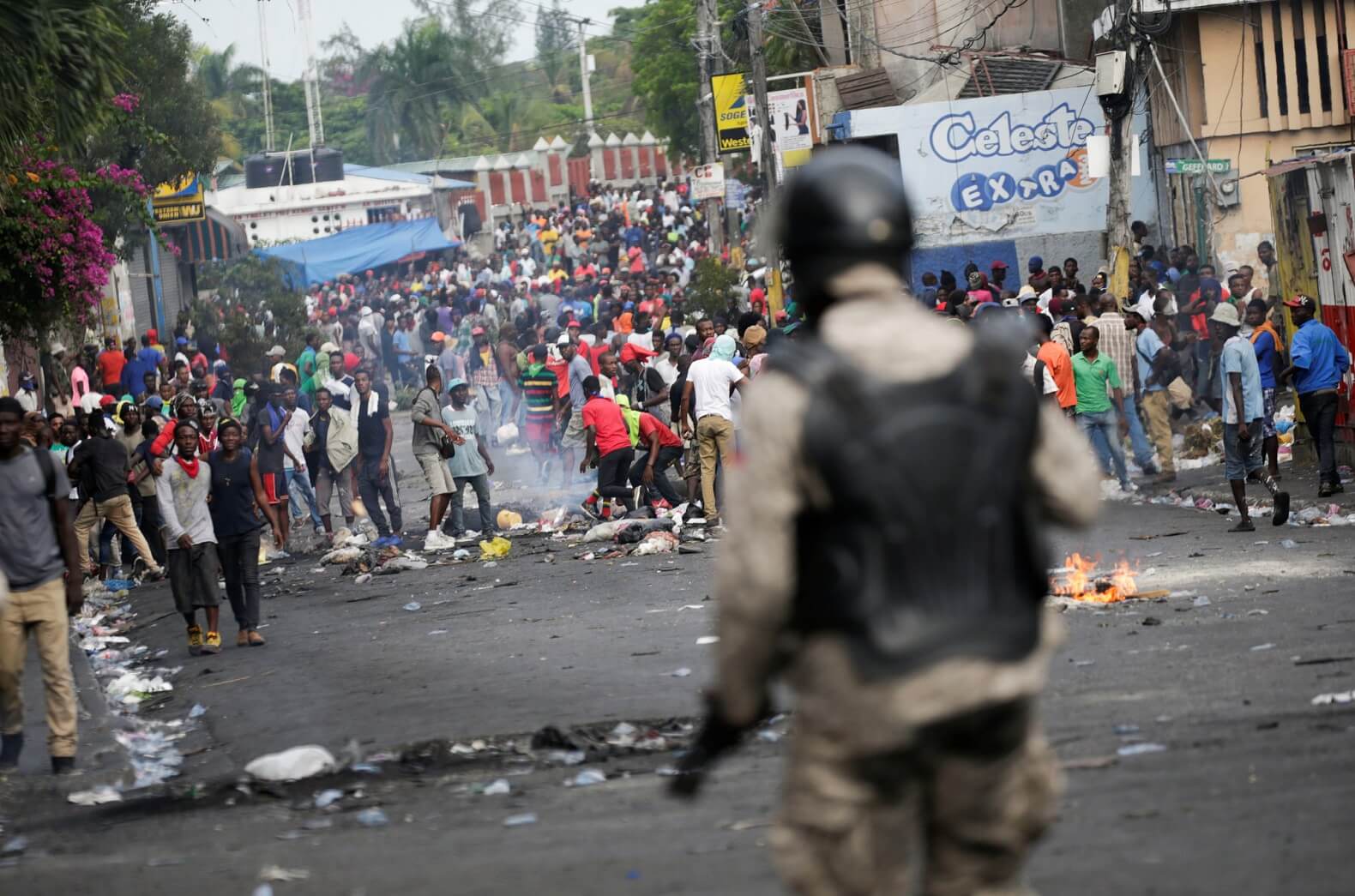Three people were killed and several injured after thousands of Haitian citizens took to the streets on Monday to demand Prime Minister (PM) Aeriel Henry’s resignation over his failure to address rising living costs and gang violence, political instability, and severe shortages of food and fuel.
Led by the National Mobilization Space (EMNA) and Haitian opposition leader Jean Charles Moïse, protesters launched “an unprecedented movement,” chanting, “If Aeriel doesn’t leave, we are going to die.” Some demonstrators donned black and red t-shirts with “rise up” and “endepandans” (independence) emblazoned on them.
Demonstrations started in Port-au-Prince and later spread to other major cities, including Cap-Haitien, Les Cayes, Jacmel, Petit Goâve, and Delmas, where two fatalities were reported, according to the EMNA. Another estimate, however, revealed three deaths. Burnt tires, road blockades, and stone pelting brought the cities to a standstill, and protesters clashed with police after bullets and tear gas shells were fired to disperse the crowds.
Manifestation populaire à Port-au-Prince, Haïti et dans plusieurs autres villes: Un mort enregistré à Delmas 38. Les manifestants réclament le départ du PM de facto qui ne peut pas, disent-ils, contrôler l’insécurité, la rareté de l’essence et la cherté de la vie. pic.twitter.com/DykMUlb2A6
— RFC (@RadioFranCoxion) August 22, 2022
The protests come at a time when inflation has skyrocketed to a 10-year-high of 29%, with rice prices having more than quadrupled and gasoline costs up to $15 per gallon. Furthermore, the national currency has depreciated by over 40% this year. To this end, Central Bank Governor Jean Baden Dubois has warned that the economy is likely to contract by 0.4% this year.
Protesters are thus demanding measures to lower the official exchange rate from 150 to 100 gourdes per dollar, arrest currency depreciation, reduce gasoline prices, and tackle surging crime.
In Les Cayes and Jacmel, fuel, if you can find it, is selling for 1,500 gourdes a gallon; that's almost $12 US a gallon. Tensions building in both cities where some are trying to protest today despite the rain. #Haiti
— Jacqueline Charles (@Jacquiecharles) August 22, 2022
Chronic gang violence has left swathes of territory out of the government’s control. Incidents of deadly clashes and kidnappings have also risen significantly after last year’s assassination of President Jovenel Moïse, following which Henry assumed charge and vowed to tackle insecurity.
However, crime has continued to surge, with the PM’s office on Monday describing it as an “alarming situation” after eight people were killed by suspected gang members in Tabarre on Sunday. PM Henry also said he was “revolted” by the offensives of the “armed bandits” and reaffirmed his government’s “firm determination to relentlessly combat insecurity.”
The UN Colonial ("Security") Council gives its unelected #Haiti puppet @DrArielHenry until Oct 17 to present a political accord /organize (s)elections. The masses responded with anti-Ariel/anti-UN/anti-CORE GROUP protests across the country. Child's sign: "Down with UN thieves" pic.twitter.com/KSlhxo7qto
— Madame Boukman - Justice 4 Haiti 🇭🇹 (@madanboukman) August 23, 2022
Haiti has witnessed recurrent violent clashes over the last year. In fact, the United Nations World Food Programme and Médecins Sans Frontières were alerted last month after thousands of citizens were “trapped” in Port-au-Prince’s Cité Soleil neighbourhood, cutting off access to humanitarian aid, food, water, sanitation, and medical care. In this respect, WFP Haiti Director Jean-Martin Bauer warned that nearly 1.3 million Haitians, specifically in the country’s northwest and south, are “one step away from famine.”
Popular discontent has also brewed against France, Canada, and the United States (the ‘Core Group’) over their alleged support for PM Henry’s attempt to take “power hostage” and to “direct everything and destabilise the country.” In fact, activists accuse the three nations of being Haiti’s “worst enemies” for backing a candidate who is “not competent to establish order and security in the country.”
US envoy to Haiti who resigned in protest of the US backing the fake Haitian prime minister Ariel Henry who is alleged to be part of the plot 👇🏼👇🏼 https://t.co/AAqql1w4eh
— Ryan Grim (@ryangrim) January 16, 2022
These allegations became more pronounced after US Ambassador Dan Foote resigned earlier this year over Washington’s backing of Henry, who has been accused of plotting his predecessor’s assassination to usurp power and suppressing investigations into his complicity in the matter. Furthermore, last week, the US Special Agent in Charge of Homeland Security Investigations Anthony Salisbury highlighted that a “marked uptick” in arms trafficking to Haiti has exacerbated the country’s security crisis, and reiterated his government’s commitment to curtail the exports of illegal weaponry.

